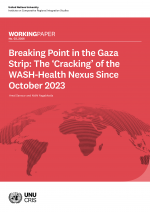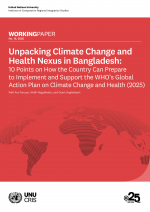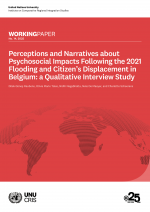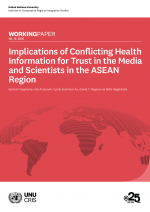Parched and Imperiled: Gaza’s Deteriorating Water Security in the Wake of the October 2023 Aggression
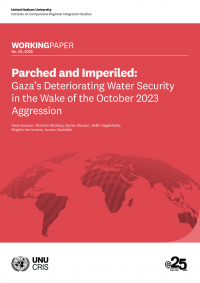
The Gaza Strip faces an unprecedented water crisis exacerbated by recent and ongoing conflict and military aggression, which commenced on 7 October 2023. This small, arid region on the Mediterranean coast, already suffering from freshwater scarcity, has worsened water insecurity due to pollution, over-extraction of the aquifer, and lack of energy and electricity. The situation is further complicated by a complex interplay of meteorological, political, legal, economic, and geopolitical factors tied to Gaza’s regional context. Despite advancements in water and sanitation infrastructure made between January 2006 and October 2023, the ongoing Israeli hostility has led to the systematic targeting and destruction of these facilities. This aggression, linked to Israeli Cabinet decisions to cut water and power supplies, has precipitated a humanitarian crisis. The weaponization of water and its infrastructure has become increasingly evident in recent aggression, with extensive damage to critical infrastructure, exacerbating the already dire conditions for the population. The conflict has resulted in the forced displacement of over 1.9 million Gazans, confining them to extreme, harsh, and inhuman conditions devoid of basic infrastructure and denying their fundamental rights to access water and sanitation services.
This displacement has significantly contributed to the deterioration of the overall situation. IHL regulates hostilities, protecting civilian infrastructure and non-fighting individuals, and prohibits attacking or destroying “objects indispensable to the survival of the civilian population”, including essential human survival items like drinking water and sanitation. During peacetime, additional protections are provided for essential services. In the context of Gaza, Israel, as the occupying power, has a legal obligation under international humanitarian law to maintain order, ensure civilian well-being, uphold public health, and provide essential resources in accordance with human rights standards. This includes preventing the deterioration of the aquifer in Gaza and ensuring sustainable access to quality water. The water crisis in Gaza underscores Israel’s responsibilities towards the Palestinian population; notwithstanding, Israel retains control over water governance, thereby limiting external interventions. No legally binding agreements or mandatory actions have been implemented. It highlights the urgent need for full access to water and sanitation services, as emphasized by recent reports from the United Nations and other international organizations. Addressing water insecurity in Gaza requires multifaceted solutions, involving inter-regional cooperation and multi-sectoral policy approaches. Without these measures, the crisis risks further environmental degradation, public health crises, economic instability, and social unrest. The brief addresses a pressing issue, offering insights into the water crisis that has intensified since October 2023, and the document incorporates recent statistics and figures from reputable sources, strengthening its arguments and effectively linking the water crisis to broader issues of conflict, infrastructure damage, and public health with distinct sections that logically progress from introduction to specific impacts and provides recommendations for policymakers and humanitarian organizations.
“Israel must stop using water as a weapon of war. Under Article 7 of the Rome Statute, intentionally depriving the civilian population of conditions of life, calculated to bring about their destruction, is an act of extermination and classified as a crime against humanity”. “Pedro Arrojo-Agudo, United Nations Special Rapporteur on the human rights to safe drinking water and sanitation, (UNOHCHR, GENEVA, 17 November 2023)”
We anticipate this working paper will serve as a valuable resource for understanding the complex water crisis in Gaza. Additionally, our set of narratives and use of recent data makes it a credible document for informing policy decisions and humanitarian efforts for current assessment of needs and gaps and post-conflict response and recovery strategies, more so those that applies to ensuring ‘water security for all’.

